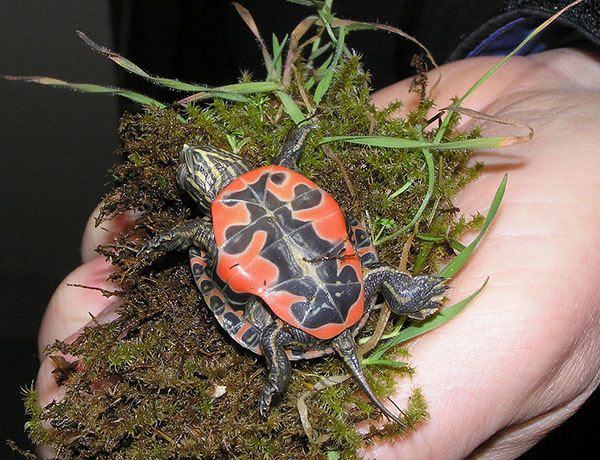SALEM, Ore. — Turtle shell fragments scattered around the nest boxes confirmed his fears: 14 newly-hatched turtles were missing. ODFW biologist Chris Yee, who monitors turtle nesting sites in Lane County, knew someone had broken into the enclosure overnight, robbing both Northwestern pond turtle nests.
The thieves took six Western pond turtle hatchlings from one nest and eight from the other. Yee, who found the empty shells scattered in the nest the following day, thinks the quarter-sized hatchlings were trafficked into the pet trade. Buyers generally think turtle hatchlings they buy online are legal to buy and own, and giving a hatchling as a gift has become popular in a world in which everything is available online.
Turtles have become widely trafficked animals across the globe. Wildlife traffickers endanger native turtle populations when they move the shelled reptiles from pond to pet trade. Unknowing community members then purchase the illegally sourced animals as pets.
In Oregon, wildlife trafficking is a poaching crime, and an ongoing problem in cities like Eugene, where ponds and wetlands are easy to access. In response, Yee fenced off an area for turtle nesting and posted signs warning the public not to disturb the sites. He even staged cameras to monitor the area. But then someone cut the fence to steal the cameras, causing about $2,000 in damages.
Not all turtle trafficking is overtly sinister and coordinated. In Oregon backyards and bedrooms, turtles live in tanks as pets. But the typical lifespan of a turtle is at least 25 years, and many live for more than 50 years. Eventually, owners become disenchanted with their pets, and attempt to re-home them or release them into a local pond.
That’s when wildlife and law enforcement officials become involved.
Oregon’s Northwestern Pond Turtle and Western Painted Turtle are necessary parts of a healthy ecosystem. They clean the environment by scavenging dead fish and other wildlife. Their eggs and hatchlings can be a food source for native wildlife. And their longevity means they are productive year after year. Populations of native Northwestern Pond Turtles and Western Painted Turtles dwindle when invasive species like Red-Eared Sliders or Snapping turtles compete for habitat and hideaways.
In Corvallis, a box marked “Live animals” and addressed to a student living in the dorms drew the attention of mailroom staff at Oregon State University last spring. It is a violation for students to have live animals in student housing. When they opened the box to investigate, staff found two baby snapping turtles. University staff notified wildlife officials, who confiscated the baby turtles.
It is against the law to purchase, possess, transport or release non-native turtles without a special license in Oregon. Non-native turtles thrive in Oregon waterways and easily out-compete native turtles. They arrive, as this one did, through illegal wildlife trafficking channels.
Earlier this year, wildlife officials captured a 25-lb snapping turtle found wandering through a Harrisburg pasture. The invasive species, which poses a threat to native fish and wildlife habitats, not to mention human hands and feet, was also a product of illegal turtle trafficking.
Snapping turtles have powerful jaws and may aggressively bite when threatened. Their sharp beaks may remove chunks of skin, according to ODFW Assistant District Biologist Marianne Brooks. Brooks measured the male American Snapping turtle found in Harrisburg at 14″ wide and 20″ long, and likely more than 30 years old.
Instead of a live turtle this year, please consider gifting a stuffie or a turtle toy.
The Stop Poaching Campaign educates the public on how to recognize and report poaching. This campaign is a collaboration among state agencies, sportsmen and other conservationists, landowners, and recreationists to engage the public in combatting Oregon’s poaching problem. Our goal is to: Incentivize reporting on wildlife crimes through the TIP Line; Strengthen enforcement by increasing the number of OSP Fish and Wildlife Troopers; and Support prosecution in becoming an effective deterrent. The campaign helps to protect and enhance Oregon’s fish and wildlife and their habitat for the enjoyment of present and future generations. Go to https://www.protectoregonswildlife.com/overview/ for more information or Contact campaign coordinator Yvonne Shaw. Yvonne.L.Shaw@odfw.oregon.gov.












